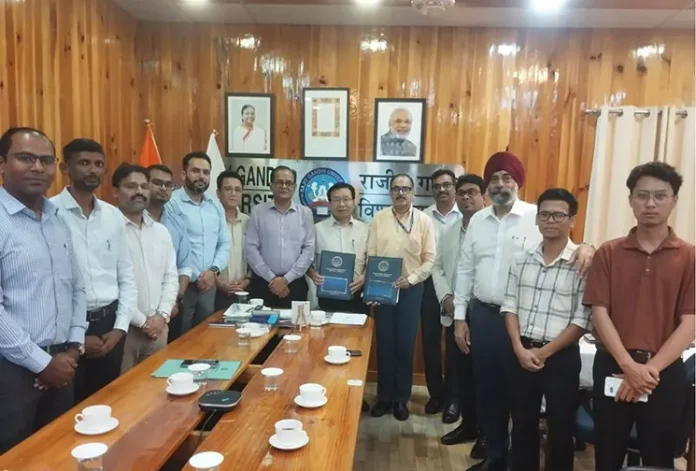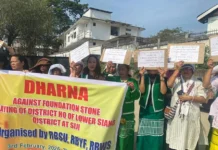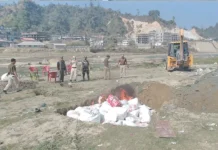RONO HILLS, 12 Aug: Rajiv Gandhi University (RGU) has entered into a significant collaboration with the North East Centre for Technology Application and Reach (NECTAR) through the signing of a memorandum of understanding (MoU) for the implementation of a project on scientific beekeeping and its value addition.
The project will be implemented jointly by the food technology department and the entomology department of RGU’s faculty of agricultural sciences.
The MoU signing ceremony, facilitated by Joint Registrar (Academics) Dr NT Jose, was attended by the RGU vice-chancellor, the registrar, the dean of the faculty of agricultural sciences, the NECTAR director general, the NECTAR CGO, experts from the departments of food technology and entomology, and representatives from the NECTAR.
Addressing the gathering, RGU Registrar Prof NT Rikam emphasized that Arunachal Pradesh, due to its challenging geographical terrain, lacks large-scale industrial infrastructure. “In such a scenario, promoting agriculture and allied activities like beekeeping can bring direct economic benefits to rural communities,” he said.
“Projects like these are not just about honey production; they are about creating sustainable income streams, empowering farmers, and reducing dependence on external markets,” he added.
Agricultural Sciences Dean Dr Sandeep Janghu explained the detailed objectives of the MoU, highlighting that the project will introduce modern scientific techniques to traditional beekeeping. He pointed out that, apart from honey, bee-related products like royal jelly, propolis, beeswax, and pollen have high market value and potential for value addition. He also stressed the importance of training, capacity building, and linking farmers to market channels to ensure the success of the initiative.
NECTAR Director General Dr Arun Kumar Sarma lauded the initiative, stating, “Beekeeping is one of the most environment-friendly agricultural activities that also supports biodiversity. Through this project, we aim to equip local farmers with the skills, tools, and scientific knowledge to improve the quality, quantity, and value of their products. This will not only increase their income but also open entrepreneurial avenues in honey processing, packaging, and marketing.”
He assured that the NECTAR would continue to support similar projects in the future to uplift rural economies across the Northeast.
RGU Vice-Chancellor (i/c) Prof SK Naik assured complete institutional support, stating, “RGU is committed to ensuring that this project runs smoothly and achieves its intended outcomes. Our departments and experts will work closely with farmers and stakeholders to ensure that scientific beekeeping becomes a viable livelihood option in our region.”
Experts from the departments of food technology and entomology added that the project would also involve the establishment of a honey processing and testing laboratory at RGU, ensuring quality control, value addition, and compliance with national and international standards. They highlighted that farmers will be trained not only in apiary management but also in post-harvest handling, branding, and marketing of bee products, making them self-reliant entrepreneurs in the apiculture sector.
This initiative holds the promise of transforming beekeeping into a profitable, sustainable, and scientifically managed livelihood in Arunachal, benefiting both farmers and the broader scientific and entrepreneurial community. Through this project, experts from the departments of food technology, entomology, and agricultural sciences will work closely with local beekeepers, providing training, modern techniques, and infrastructure for honey processing and testing.
This collaboration aims to not only improve livelihood opportunities for farmers but also contribute significantly to the scientific and entrepreneurial development of apiculture in the region.




